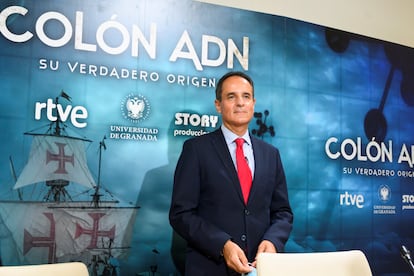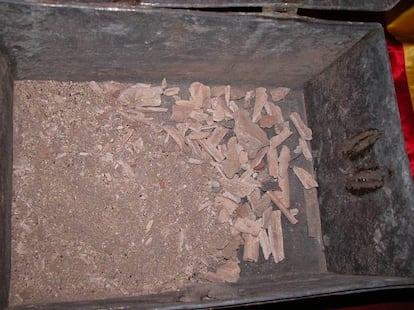Presentation of analysis on Christopher Columbus’ alleged remains postponed indefinitely
Forensic scientist José Antonio Lorente, who claimed that the explorer was a Jew from Spain in a documentary, said he would publish his results in November

The controversial forensic scientist José Antonio Lorente, who has spent more than two decades analyzing the DNA of the alleged bones of Christopher Columbus and his relatives without publishing any conclusive data, has indefinitely postponed the presentation of his findings. The announcement came via a statement from Lorente himself, shared with EL PAÍS on Monday by his institution, the University of Granada.
A documentary titled Columbus DNA. His True Origin, which aired on Spain’s public broadcaster on October 12 and featured Lorente, argued that the most likely hypothesis about Columbus’ origins was that the explorer was not a Genoese Christian but a Jew born in modern-day Spain, from a family of Valencian silk weavers. This claim faced heavy criticism from the scientific community due to the total lack of evidence. Lorente responded to the backlash by promising to reveal “the complete and detailed scientific results” at a November press conference.
Now, the narrative has shifted. “The international scientific team led by Professor José Antonio Lorente has made the decision to publish absolutely all the DNA data obtained in this research,” reads the statement, dated November 20. “The original idea was to publish only the most relevant data, but the scientific team is convinced that publishing all the information is the best alternative so that all the data can be accessible to anyone, which will facilitate future studies and comparisons.” It adds: “The large amount of data that is being included in the publication makes the scientific work to be published especially dense and complex, so we are working intensively to be able to meet the necessary requirements and publish it as soon as possible.”
In 2001, high school teacher Marcial Castro, from Estepa, Seville, suggested that Lorente analyze the DNA of Colombus’ alleged remains, which were housed in the Seville Cathedral. Lorente’s team obtained permits and, in 2003, exhumed the supposed remains of Columbus, along with those of his son Hernando, interred in a nearby tomb. They also examined the alleged remains of Diego Columbus, the navigator’s brother, discovered in a former Carthusian monastery in Seville that had been repurposed as a pottery factory. At the time, Lorente claimed to have assembled a prestigious team of collaborators and promised results by 2004,
Geneticist Ángel Carracedo, from the University of Santiago de Compostela, was one of those collaborators. But when he saw that the DNA of the alleged remains of Christopher Columbus was extremely degraded, he withdrew from the project. Mark Stoneking, from the Max Planck Institute for Evolutionary Anthropology in Leipzig, Germany, similarly distanced himself. In the two decades since, Lorente has not published any scientific findings but has starred in two documentaries. The first, Enigma Columbus, aired on the Discovery Channel on October 12, 2004. Without showing any proof, Lorente declared in 2006 that there was “no doubt” the bones in the Seville Cathedral belonged to Columbus. In Santo Domingo, in the Dominican Republic, there are other human remains, which are claimed to belong to the navigator.

Although no comprehensive study has yet been published, the documentary aired on Spanish television last month made world headlines. “Columbus probably Spanish and Jewish, study says,” was the headline of a BBC story. “Columbus was a Sephardic Jew from Western Europe, study finds,” reported Reuters. In his latest statement, Lorente announced that his findings “will be available in an indexed scientific journal and accessible, directly and free of charge, to anyone interested in the subject,” but refrained from providing a specific timeline.
Experts have been waiting for results since 2003, including Antonio Alonso, one of Spain’s foremost authorities on forensic genetics. After watching the documentary, the expert questioned its findings. “Unfortunately, from a scientific point of view, no assessment can be made after watching the documentary, since it does not provide any data on what has been analyzed. My conclusion is that the documentary Columbus DNA does not show the DNA of Columbus at any given moment, and scientists do not know what analysis has been undertaken.”
Alonso — who had been awaiting Lorente’s promised press conference on the results — believes his latest statement is telling. “The statement confirms that the investigation lacked transparency and that DNA results had not been previously presented to the scientific community, as denounced by forensic and ancient DNA professionals at both national and international levels. According to the statement, it appears that the DNA research isn’t even fully documented,” says Alonso, whose expertise includes identifying victims of the 2004 Madrid train bombings and investigating claims babies were stolen under the Franco dictatorship in Spain.
“Over the past few weeks, historians and geneticists have discredited both the very approach of the various unfounded hypotheses about Columbus’ birthplace, as well as the lack of rigor of the conclusions based on DNA studies on the biogeographic origin,” Alonso continues. “From my point of view, public television — responsible for broadcasting the documentary, which announced it on [the popular Spanish show] La Revuelta and aired it in prime time as ‘the documentary that was going to rewrite history’ — should be the most interested in clarifying as soon as possible all the doubts that have been cast on this investigation and, if necessary, it should promote transparent and truthful communication about Christopher Columbus’ DNA data.”
After the documentary garnered worldwide attention, some of the world’s leading experts criticized Lorente’s approach. Johannes Krause, director of the Max Planck Institute for Evolutionary Anthropology, told EL PAÍS that he did not intend to comment on any research presented in a television documentary. “If I did, I would also have to comment on aliens, the flat Earth theory, Atlantis, and other pseudoscience,” he said.
David Reich, from Harvard University, was also blunt. “We need the data to be available, otherwise it is impossible to know if the conclusions are correct,” he explained. “Before we can take such a claim seriously, all the evidence and data must be published.” He added: “It would be preferable for an independent laboratory, one that isn’t tied to a television documentary, to analyze the DNA and confirm the results.”
Sign up for our weekly newsletter to get more English-language news coverage from EL PAÍS USA Edition
Tu suscripción se está usando en otro dispositivo
¿Quieres añadir otro usuario a tu suscripción?
Si continúas leyendo en este dispositivo, no se podrá leer en el otro.
FlechaTu suscripción se está usando en otro dispositivo y solo puedes acceder a EL PAÍS desde un dispositivo a la vez.
Si quieres compartir tu cuenta, cambia tu suscripción a la modalidad Premium, así podrás añadir otro usuario. Cada uno accederá con su propia cuenta de email, lo que os permitirá personalizar vuestra experiencia en EL PAÍS.
¿Tienes una suscripción de empresa? Accede aquí para contratar más cuentas.
En el caso de no saber quién está usando tu cuenta, te recomendamos cambiar tu contraseña aquí.
Si decides continuar compartiendo tu cuenta, este mensaje se mostrará en tu dispositivo y en el de la otra persona que está usando tu cuenta de forma indefinida, afectando a tu experiencia de lectura. Puedes consultar aquí los términos y condiciones de la suscripción digital.









































